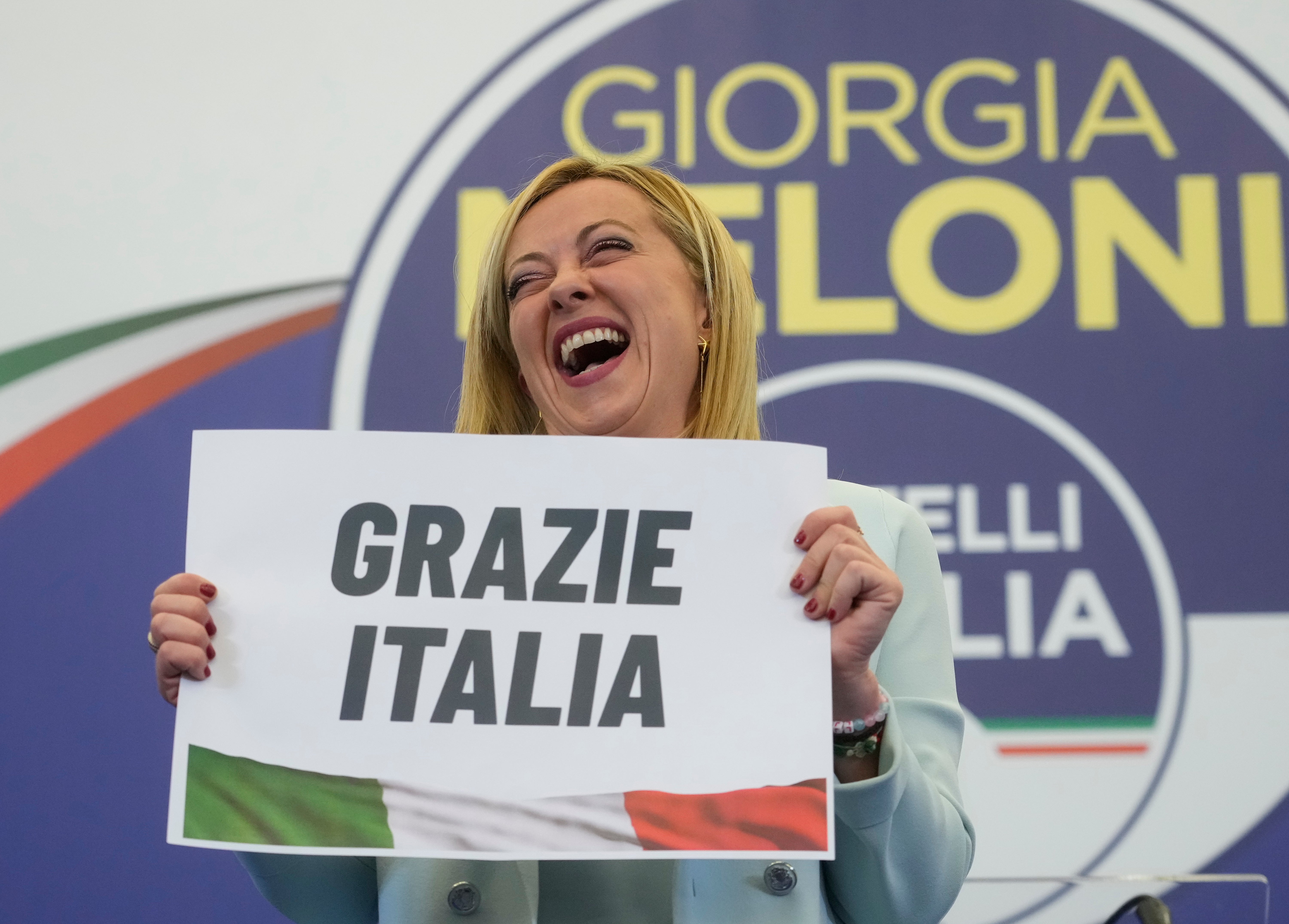What Europe can expect from Italy under Giorgia Meloni
A colourful government is in store in Rome but a serious rift with the EU is unlikely says Sean O’Grady


As election results made it clear the far-right Fratelli d’Italia (Brothers of Italy) will lead a radical populist coalition, party leader Giorgia Meloni held up a card that said “Grazie Italia”. It’s fair to say that most of the rest of Europe is less thankful for her emergence.
Often dubbed “fascist” or “neo-fascist”, her party does have roots that date back to open post-war Italian fascism, and thus back to the disastrous dictatorship of Benito Mussolini. However, one of the most intriguing aspects of the governing coalition is exactly how it will choose to govern, where it will bend to reality, and where it will choose to compromise with the European Union, whose “rule book” may not always be compatible with the new Italian government’s plan given that Ms Meloni will have to try and forge a strong and stable government in an administration that contains the volatile Forza Italia leader Silvio Berlusconi, who is 85, and Matteo Salvini of Lega (”the league”).
It will, for sure, be socially conservative on issues such as LGBT rights and adoption, and fiercely anti-immigrant, but beyond that, the policy outlook becomes opaque.
For example, one immediate risk for the EU and the wider world is what stance Ms Meloni and her as-yet-unchosen foreign minister take on Ukraine. Ms Meloni herself appears to be committed to the broad western policy of sanctions, military and financial assistance. Yet Italy is partly dependent on energy supplies from Russia, and Berlusconi has been close to Vladimir Putin for many years. In the last few weeks he has made sympathetic noises about the invasion, suggesting it was forced on Putin and that the “special operation” as he called it, was designed to capture Kyiv and “replace the Zelensky government with decent people”. Berlusconi later clarified his stance, while Salvini, leader of Lega (formerly Lega Nord) has also expressed admiration for President Putin. So who knows?
Similarly, Italy’s relationship with the EU is also set to become less comfortable than it was under the technocratic Mario Draghi, a former governor of the European Central Bank – but how much? Ursula von der Leyen, president of the EU Commission, made a bit of a pre-emptive raid by reminding Italy that Brussels had “tools” at its disposal to deal with any violation of democratic norms by the government in Rome.
Meanwhile, France was quick to warn Italy not to wind back gay rights or women’s access to abortion. Elisabeth Borne, the French prime minister, said the EU had certain values to uphold, such as those on abortion and human rights. “We will be attentive, with the president of the European Commission, that these values of human rights, the respect of one another, notably the respect of abortion rights, are respected by all,” she told French television. “In Europe, we have certain values, and obviously we will be vigilant.”
If the record with Hungary and Poland is anything to go by, also governed by rightist nationalistic elements, then Italy will probably settle into an uneasy sort of cold war on social issues with Brussels – with neither side especially keen on escalating hostilities.
The bottom line with all of the recalcitrant states is that none of them show any enthusiasm for leaving the EU a la Brexit; and the EU is often prepared to accommodate most of their idiosyncrasies, such as Viktor Orban’s soft line for Hungary on Russian sanctions. In Italy’s case, support for leaving the EU is modest, despite irritation about migration and the EU response to Covid. Italy very much needs EU resources to support its banks and sovereign debt, as well as to provide investment in infrastructure. Ms Von der Leyen, in others words, does indeed have leverage over Italy. There will be bust-ups, but none fatal.
The emergence of Meloni should remind the rest of Europe that the populist far right hasn’t gone away, and is still a force to reckon with. Recession, inflation and continuing migration provide just the right sort of conditions to propel small splinter groups such as the Brothers of Italy into power, often aided by proportional voting systems with low thresholds to gain parliamentary representation. Insurgent groups will constantly try to outflank and replace one another, usually at the expense of established parties of the left and right. The arrival of AfD in Germany and the relatively strong showing for the Sweden Democrats and Marine Le Pen’s National Rally are other recent examples of how the far right can make inroads even in the most prosperous and liberal of nations. Italy is no longer an outlier.
Subscribe to Independent Premium to bookmark this article
Want to bookmark your favourite articles and stories to read or reference later? Start your Independent Premium subscription today.



Join our commenting forum
Join thought-provoking conversations, follow other Independent readers and see their replies
Comments